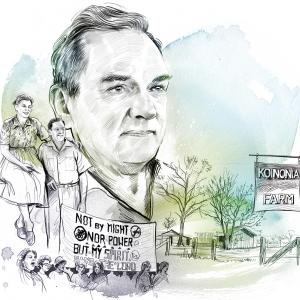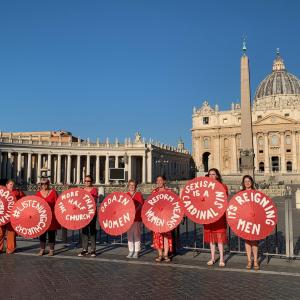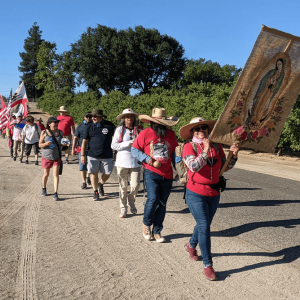
Mitchell Atencio is the senior associate news editor at Sojourners. He first served as a contract reporter for Sojourners in 2020.
Mitchell believes his role as a journalist is to ask compelling questions of the right people and to tell stories that impact the actions of readers. He loves writing stories of the radical or unique — especially within faith. Before joining Sojourners, Mitchell was a reporter in Kirkland, Wash. At Arizona State University he was a passionate and dedicated member of the award-winning, independent, student-newspaper The State Press. He also graduated with a degree in journalism and mass communications, but he doesn’t care as much about that part.
Although he didn’t stay long enough, Mitchell is proud to have been born in Atlanta and dreams of returning.
In journalism and elsewhere, Mitchell advocates for the physical medium. He is a vinyl record collector; a film photographer who shoots, develops, and scans his own film; a magazine subscriber; and a fan of writing letters on the family typewriter. In his spare time, he reads liberation theology, practices Zen, watches a lot of tennis, rants about the evils of pickleball, and makes coffee with a variety of methods. Mitchell is discalced out of religious commitment; he concedes it probably makes him a hippie.
Posts By This Author
Why ‘The Muppet Christmas Carol’ Is a Radical Christian Classic
The 1992 classic is full of wonders you can’t find anywhere else: Michael Caine starring in a children’s movie, a ghost of Christmas future that haunts me every time I consider splurging on frivolities, and a drum set at a Victorian England Christmas party. But the movie isn’t just a fun, Muppet-y take on Charles Dickens’ classic novella; it’s also a compelling screenplay with heart-warming, humorous songs that offer a radical Christmas message of “cast down the mighty … send the rich away empty.”
LGBTQ Christians Reflect on Shifts in the ‘Evangelical Vatican’ After Club Q Shooting
Thom Andreas was a gay Christian kid in the 1990s when his hometown of Colorado Springs, Co. was becoming known as the “evangelical mecca” or “evangelical Vatican.” And this gave Andreas a front-row seat as the movement advocated against LGBTQ rights and dignity in politics and faith.
Delores S. Williams, Groundbreaking Womanist Theologian, Dies
Delores S. Williams, a trailblazer and founder of womanist theology, died on Nov. 18. She was the author of Sisters in the Wilderness: The Challenge of Womanist God-Talk and a professor of theology.
The Radical Southern Farmer White Christians Should Know About
Clarence Jordan and the Koinonia community fought Jim Crow with a “cow library” and a radical faith. There's still work to do today.
CLARENCE L. JORDAN died on Oct. 29, 1969, at 57 years old. The radical Southerner who dedicated his life to farming, sharing the gospel, and imploring his neighbors to actually follow Jesus is not widely remembered. Jordan died as simply as he lived — buried in a wooden box used to ship coffins, in an unmarked grave, and wearing his overalls. In early 2020, a little more than 50 years after Jordan (pronounced “Jurden”) died, I came across his work and was enamored. I began reading anything from or about him I could find. Jordan’s Georgia roots and love for the South mirrored my own. His charm and cutting humor were irresistible. Most appealing was Jordan’s stubborn commitment to radically following Christ, which led him to reject and rebuke the practices of racism, capitalism, and militarism in the U.S.
On the podcast Pass the Mic, writer Danté Stewart put a name to what I found in Jordan. “The reason why white [siblings] are struggling in this moment is because most of their models have been violent white supremacists,” Stewart said. “White [siblings], they don’t have models of liberation and love, so therefore they’re struggling in this moment.” Clarence Jordan was a “model of love and liberation” that we can learn from now. The dehumanizing forces of racial capitalism and militarism are no weaker in the U.S. today than in his lifetime, and many white Christians are avid proponents of both. Jordan’s resistance and radical theology did not die with him; instead, they can evolve and grow with the times. We should engage Jordan without idolizing him and advance his core commitments with a critical eye, honestly appropriating them for our modern struggles.
How To Read the News Without Sacrificing Your Mental Health
If God is calling us to build more just communities, we are first called to know what is happening in those communities — and for that, we often need the work of journalists. But engaging news should not come at the expense of one’s mental health and emotional wellbeing. Here’s how engaging the news can be a personally and societally beneficial process.
About Those Post-Hurricane Church Mission Trips
The crises that Puerto Ricans are facing are not simply the results of “natural” disasters, according to Carlos A. Rodríguez. As founder and CEO of The Happy Givers, a Puerto Rico-based nonprofit that provides meals, rebuilds homes, and operates a community farm on the island, Rodríguez sees firsthand the harms of U.S. colonialism and climate change. On the island, residents are very clear that they are oppressed by their status as a colony, and when natural disasters hit, the pain is exacerbated.
7 Reasons Not to Freak-out About Decline of US Christianity
The decline of Christianity in the U.S. has been documented by the Pew Research Center, which projects that Christianity may decline significantly over the next fourty years. On Sept. 13, Pew Research Center released four hypothetical scenarios that model what the religious landscape of the United States might look like if current demographic trends continue. The four models projected that the U.S. population who identify as Christian would decline from 64 percent in 2020 to between 35-54 in 2070. But that may not be a bad thing.
Students, Faculty Sue to Stop Trustees from ‘Destroying’ Seattle Pacific University
A group of students, faculty, staff, and alumni from Seattle Pacific University filed a lawsuit against the university’s board of trustees after over a year of protesting policies that do not allow full-time staff and faculty in same-sex relationships to be hired.
What Does ‘White Christian Nationalism’ Even Mean, Anyway?
Ever since Jan. 6, 2021, the term “Christian nationalism” has proliferated in discourse, but the precise definition is up for debate. Is Christian nationalism only applicable to those who welcome the label, like Georgia Republican Rep. Marjorie Taylor Greene, who sells “Proud Christian nationalist” t-shirts, and Southern Baptist Theological Seminary president Al Mohler, who said he wasn’t going to run from Christian nationalism on a recent podcast episode? Or can it be applied to hanging images of Jesus in congressional offices and the post-rapture book and movie series Left Behind?
‘Sexism Is a Cardinal Sin’ Catholic Women Tell Vatican
Kate McElwee, the executive director of the Women’s Ordination Conference and one of the women at the protest, spoke with Sojourners’ Mitchell Atencio about her hope for women’s ordination, Francis’ attitude toward reforms, and the symbolic nature of their activism.
Why Faith Leaders Joined Farmworkers During Their 335-Mile March
The marchers, organized by the United Farm Workers, were joined by hundreds of allies, including faith leaders, throughout their march. Farmworkers marched through triple-digit temperature days on their peregrinacion (pilgrimage). They carried American and Mexican flags, flags with union logos, and a banner featuring a large image of Our Lady of Guadalupe, a title for the Virgin Mary that carries special significance for Mexican and Mexican-Americans. Marchers proclaimed, “We feed you!” and chanted the UFW slogan “Sí, se puede (Yes, it can be done!)”
Under Investigation for Discrimination, Seattle Pacific University Sues
Seattle Pacific University announced on July 28 that it is suing Washington state Attorney General Bob Ferguson, after the attorney general opened an investigation into whether SPU was violating the state’s anti-discrimination laws. SPU, which is affiliated with the Free Methodist Church, contends that Ferguson’s investigation is a violation of the school’s religious freedom.
Churches and the NFL Share the Same Sin
The question, for all of us, is what do abusers gain by offering vague apologies? What are they trying to achieve? The men and their supporters are attempting to weaponize a Christian culture of unending forgiveness. While forgiveness is indeed a virtue, it should never come at the expense of those harmed. [John] Crist and [Deshaun] Watson (and their colleagues) refuse to properly repent, apologize, or seek to repair the harm they are accused of. Instead, they ask their victims — and us — to move on.
Ron Sider, Who Called Evangelicals To Social Justice, Dies at 82
Ronald J. Sider, founder of Christians for Social Action and a stalwart evangelical advocate for social justice, died of a cardiac arrest on July 27. He was 82 years old.
Why Faith Scholars Joined a Critical Race Theory ‘Summer School’
Last week the African American Policy Forum held its third annual summer school for scholars to discuss and develop anti-racism efforts in the United States. This year, AAPF dedicated a portion of its programming to “Keeping the Faith,” an exploration of Christianity and critical race theory.
Protests, Pride Flags, Lawsuits: Inside a Christian University’s Fight for LGBTQ Inclusion
Over the last year, the majority of Seattle Pacific University’s community has been unwavering in its affirmation of LGBTQ equality on campus ... Nevertheless, on July 1, the evangelical university’s board of trustees affirmed — for a third time in about a year — that the school would not change its employee policy.
Six Down, Six To Go
Welcome to the second half of 2022.
Roe Is Over: Faith Leaders On What That Means for Christians
The Supreme Court overturned 49 years of federal abortion rights on Friday, in its decision on Dobbs v. Jackson Women’s Health Organization. Faith leaders and advocates told Sojourners they were not surprised by the court’s decision, which was nearly identical to the draft leaked in May. However, many leaders echoed Rev. Katey Zeh, CEO of the Religious Coalition for Reproductive Choice, who told Sojourners that “the emotional impact of a moment like this can’t be underestimated.”
Eboo Patel Wants To Build Better Institutions
In his new book, We Need to Build, Patel seeks to inspire others to build with him instead of just criticizing policies and structures they dislike. The book draws on Patel’s work with Interfaith America and considers what we can learn from good (and bad) institutions across the globe.
Exploring the Gospel Through the Lens of Grief
Singer-songwriter Natalie Bergman navigates deep loss and fervent faith in her solo work 'Mercy.'
NATALIE BERGMAN DID NOT anticipate a particular response from Christians to her first solo album, Mercy. Released in May 2021, it was a departure from Bergman’s work with her brother in the duo Wild Belle, offering a gentler sound and deep lyrics. Yet Mercy has been hailed as a masterpiece that explores gospel through the lens of grief. Christians, particularly millennials and Gen Zers who long ago grew sick of Air1 and K-LOVE, have celebrated the work.
But Bergman wasn’t thinking about listener reaction before releasing Mercy. She wrote, produced, and mixed the album entirely by herself to process the grief after her father and stepmother were killed by a drunk driver. She said she felt “protected” in its release.
“I knew—after I put the album out—that I was going to have some sort of feedback on [Mercy] from people that are believers ... but I went into this with no fear,” Bergman told Sojourners before her March performance at Songbyrd Music House in Washington, D.C. Citing right-wing trucker protests and other authoritarian manifestations of Christianity, Bergman said she realized later it was a “kind of courageous thing to [release] this body of work, because of the political climate and because of the history that religion has.”
Mercy and the follow-up EP, Keep Those Teardrops from Falling, are fundamentally gospel in every sense of the term.



















